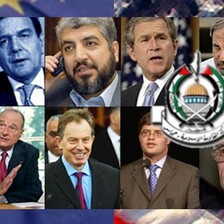Al Jazeera 31 March 2005

Posters on a wall in Jenin refugee camp. In the middle, the late Hamas founder and spiritual leader Sheikh Ahmed Yassin, who was assassinated by Israel in a massive missile attack a year ago. (Feroze Sidhwa)
The Palestinian Islamic Resistance group, Hamas, and its sister organisation, the Islamic Jihad, have decided in principle to join the Palestine Liberation Organisation, the PLO.
The landmark decision, a result of prolonged internal deliberations, is expected to have far-reaching consequences for Palestinian politics and inter-faction relations, especially between the two largest political movements, the Islamist Hamas and nationalist Fatah.
As such, the decision could strengthen Palestinian national unity vis-a-vis Israel, but is unlikely to significantly affect the peace process, especially in the short run.
Some say a restructured and reformed PLO, in which Hamas and its Islamist and other allies play an influential role, would inaugurate a new era in Palestinian political life.
Hamas leaders say the movement had always been interested in joining the PLO, and what stood in the way was the secular PLO leadership’s condescending attitude towards the Islamist movement.
“Our decision to participate in the PLO is not new. It is a long-standing and clear decision,” Mahmud al-Zahar, the head of Hamas in Gaza City, said this week.
Opportune moment
However, several factors have combined to make this a most opportune moment for Hamas to take the plunge.
For one, Hamas feels it is now strong enough, and confident enough, to join the PLO, not as a spoiler or an upstart as the movement was once perceived by the PLO’s factions, especially in the early 1990s, but as a full partner and even a potential saviour.
It is worth recalling that PLO chief Yasir Arafat, in 1992, called Hamas “the Palestinian Inkatha”, comparing it to the Zulu-dominated South African political party that opposed the National African Congress led by Nelson Mandela.
But today Hamas, after having spearheaded the Palestinian intifada against Israeli occupation and bolstered by its recent election gains in Gaza and the West Bank, feels more than qualified to join the PLO, an organisation dominated by the secular nationalist Fatah since its creation in the mid-1960s.
A second factor behind Hamas’ decision is that its leaders, both at home and in the diaspora, have come to realise that only through joining the PLO - the main Palestinian national decision-making body - will the movement be able to make the transition from the factional sphere to the national arena.
Political power
Hamas leaders know only too well that, for all its perceived achievements and pre-eminence during al-Aqsa Intifada, the movement has been playing a marginal role in formulating the general national policies affecting the Palestinian people.
Through membership in the PLO, these leaders hope, the movement will be able to convert its popularity in the Palestinian Arab street into commensurate political power at the national level.
A third reason for Hamas’ entry into the PLO is the hard fact of the latter’s status as the “sole and legitimate representative of the Palestinian people”, both at home and in the diaspora.
The Islamist movement wants to see its influence (and of course its ideology) extend to Palestinian refugees abroad, not through the backdoor of Palestinian and regional politics but in an institutionalised and orderly manner. And this can only be done through membership in the PLO.
To hear al-Zahar explain it, there was a growing concern within Hamas that the PLO, and by extension the Palestinian Authority, was not sufficiently strong and reliable to be solely entrusted with the national cause.
“I can tell you that one of the main reasons for joining the PLO is to prevent it from conceding to Israel on the paramount national issues,” al-Zahar said in an interview to Aljazeera.net on Tuesday.
Peace mirage
Asked if he thought the inclusion of Hamas into the PLO would radicalise the latter and consequently make a peace settlement with Israel even more unlikely, al-Zahar said Hamas, indeed a great majority of Palestinians, do not believe that “peace with Israel is around the corner”.
“We are convinced that Israel is only using the so-called peace process as a rubric for consolidating its occupation and colonisation in the West Bank,” he said.
“What is happening now and which will continue for many years to come is not a real political process. It is actually no more than public relations and crisis management. The Americans known it, the Zionists known it and even the PA knows it…”
Al-Zahar further argued that US President George Bush’s vision for a Palestinian state living side by side with Israel is a deception.
“Bush speaks about a viable Palestinian state and at the same time he is telling [Israeli Prime Minister Ariel] Sharon that he could keep half of the West Bank in the context of any final-status settlement. What kind of state, what kind of peace, are they talking about?”
Cardinal issues
Al-Zahar’s view stems from a strong Hamas conviction that a solution to the Israeli-Palestinian conflict, even one meeting the most minimal Palestinian expectations, is a long way away given Israel’s determination to swallow up large chunks of the West Bank, including East Jerusalem, which would make the creation of a viable Palestinian state unrealistic if not impossible.
In fact, some Palestinian intellectuals believe a Hamas-influenced PLO will be more capable of withstanding international, including Arab, pressure to compromise on such cardinal issues as Jerusalem, Palestinian refugees and illegal Jewish settlements in the West Bank.
Speaking to Aljazeera.net, Ali Jarbawi, professor of political science at Bir Zeit University and a former head of the Palestinian Election Commission, said: “Hamas will influence and be influenced as is usually the case in such circumstances. However, I do believe that the inclusion of Hamas will make the PLO more meticulous and more determined about safeguarding Palestinian rights.”
As far as Israel’s reaction is concerned, there can be little doubt about its disappointment. After all, the country has not spared any effort to demonise Hamas in the eyes of the world, and eventually succeeding in getting the Islamist movement blacklisted as a terrorist group in both the US and Europe.
Israeli reaction
The possible rehabilitation of Hamas through inclusion into the PLO can hardly be good news, then, for Israel’s defence and foreign-policy establishment.
The Israeli military commentator Ze’ev Schiff says Israel is likely to refuse to negotiate with a reconstructed PLO, not so much because Hamas does not recognise Israel but because the new PLO would adopt a harder line towards Israel, especially in matters pertaining to Jerusalem, refugees and Jewish settlements.
If that turns out to be the case, then Israel’s problem would not be with Hamas per se but rather with an evolving Palestinian national consensus on the minimum requirements for peace in the region.
In one scenario, Israel might use the inclusion of Hamas in the PLO as a pretext for refusing to end its occupation and colonisation of Palestinian lands. But even that would not be the worst-case scenario.
Khalid Amayreh is a journalist based in the occupied West Bank. This article was originally published by aljazeera.net and reprinted on EI with permission.





